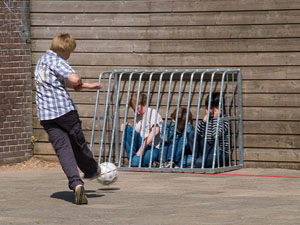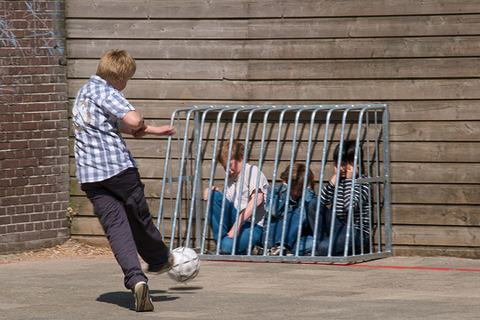 Leonard Witt, executive director of the Center for Sustainable Journalism and publisher of Youth Today and the Juvenile Justice Information Exchange recently spoke with Judge Gail Garinger while at a symposium hosted by the John Jay College of Criminal Justice.
Leonard Witt, executive director of the Center for Sustainable Journalism and publisher of Youth Today and the Juvenile Justice Information Exchange recently spoke with Judge Gail Garinger while at a symposium hosted by the John Jay College of Criminal Justice.
Garinger is now Child Advocate for the Commonwealth of Massachusetts.
LEONARD WITT: You talked about the idea of bullying – and it’s on everybody’s mind right now – and you’re a little bit worried the legislators are going to over-react. Can you talk about that a little bit?
JUDGE GAIL GARINGER: As you mentioned, I’m from Massachusetts, and what we saw in Massachusetts was a very tragic situation involving a suicide of a young woman who had been continually bullied in the school. And as a result of that tragic event, legislation was quickly passed in Massachusetts. It was something that I felt very strongly needed to be slowed down, we really needed to think through A) whether an additional law was needed to deal with the behavior that had taken place, and B) just to make sure if a law was going to be put into effect that we be thoughtful and craft it in a way that was really going to result in the best outcomes for kids.
LW: So what happened?

Judge Gail Garringer.
GG: So what happened was there was a real rush to pass the legislation, and as a result of that legislation my office receives help-line calls predominantly from parents whose children have been charged with bullying in the public schools – children as young as seven that have been charged with “bullying-like” behavior.
LW: What does that mean?
GG: Well that’s what we’re trying to help sort out. One call we received was about a seven-year-old girl who was on an IEP, which is an individualized education plan. She’s on the very high-end of the autism spectrum – a very smart girl, but has trouble with her boundaries, especially with other kids. She kind of gets in their face. When she does that some kids kind of step back and feel really awkward. So she was put on a slippery slope and accused of bullying-like behavior.
LW: And how old again?
GG: Seven.
LW: Wow.
GG: And then her IEP issue was to deal with this awkwardness around boundaries. So she was in fact being punished with the bullying legislation for the very behavior she was supposed to be getting assistance with in the school.
LW: Interesting. Judge Steven Teske wrote a column about sometimes kids who are bullied -- and so the reaction is to hit back at some point, and then they’re in more trouble than the kid who was doing the bullying. Do you run into that case too?
GG: Absolutely. Yes, we’ve certainly seen that.
I think any of us who are parents know very often that the kid that retaliates against the sibling is the one we land on, never having seen what proceeded that. I think the same kind of thing is happening in the schools with kids who are being bullied coming to school, perhaps, with even weapons because they’re so fearful of what might be going on.
We’re mainly concerned with the fact that we feel it was a law that was passed very, very quickly. It’s being applied to situations which should be dealt with in the schools in a very different way. We’re creating juvenile court records for kids as young as seven or eight, and these are part of their juvenile court record even if they’re case is dismissed. They’ll forever have on their juvenile record that they were charged with bullying.
LW: So… what? Bullying is not necessarily a good thing, so what do you do about that then? You’re not sanctioning it right?
GG: No, of course not. I take serious bullying very, very seriously. But I think what we’re talking about is having schools create reasonable alternative programs for working with children, working with parents, and responding appropriately – not blowing out of proportions a situation and really individualizing a response.
I think school officials have gotten really frightened because of what’s been occurring and it’s much easier to take a zero-tolerance approach and just label everything quickly as bullying and pass it on to someone else to deal with, rather than try to work out a creative solution within the school that’s best for everyone involved.
LW: So you don’t think it should have been put into the legal arena? You think it’s something that can still be worked out in school?
GG: I think that in most cases – in most cases – the school is the best place to deal with it. That’s where the behavior occurred. That’s the people who should have the best understanding of what the school climate is like, what’s going on within the school.
It results in kids hopefully not being suspended unnecessarily, not being brought into the juvenile justice system, and addressing the behaviors, again, in a way that’s appropriate to the actual circumstance.
We have laws on the book that deal with really egregious bullying. We have assault and battery. We have harassment laws in most states. We have disturbing the conduct of a school. There are other ways to deal with the problem.
And again, I think that the typical response is to quickly pass a new law when we have a tragedy occur as opposed to really sitting down and thoughtfully talking about what’s the best way to address the situation.
LW: Yeah, they used a term today called ‘moral panic.’ What does that mean exactly?
GG: Well, moral panic, to me, I think some people would say a bit of hysteria often results from a tragic outcome. I think moral panic is more appropriate.
We want to do something. A legislator’s typical response is to pass a new law. That’s what they think of as being their way to respond appropriately to a situation. And as we’ve talked about a lot today, I think the media plays a large role in fuels, in stoking the fires of the public, to respond, and for politicians to respond to public pressure.
LW: So you’re basically saying, “Everyone take a deep breath, and take a minute to consider.” Isn’t that right?
GG: What I’m saying is that maybe a new law is needed in your state to deal with a situation, but don’t rush to do it. Sit down. Really talk about what happened.
There’s an old saying: “If the only tool you have is a hammer, everything is defined as a nail.” If you only think about the only tool you have is to pass a new law, it’s really going to preclude, I think, of you sitting down and talking about all the options that are appropriate for the situation.
Top photo via trix0r
